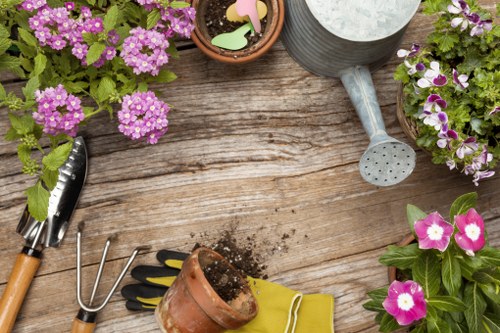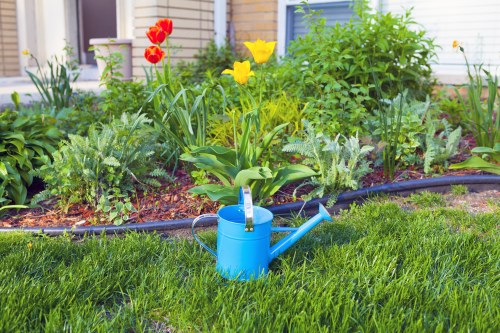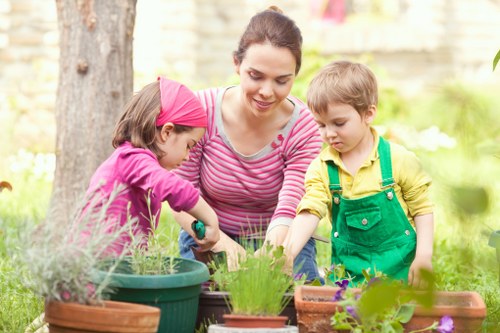Garden Maintenance in St Johns Wood

Maintaining a beautiful garden in St Johns Wood requires dedication, knowledge, and the right resources. Whether you're a seasoned gardener or a beginner, understanding the intricacies of garden maintenance in this prestigious London neighborhood can transform your outdoor space into a stunning retreat.
St Johns Wood is renowned for its picturesque homes and lush gardens, but the unique climate and soil conditions here necessitate specialized care. Proper garden maintenance not only enhances the aesthetic appeal of your property but also ensures the health and sustainability of your plants.
In this comprehensive guide, we'll delve into the best practices for garden maintenance in St Johns Wood, offering tips and insights to help you create and preserve a vibrant garden throughout the year.
Understanding the St Johns Wood Climate and Its Impact on Garden Maintenance

The climate in St Johns Wood is characterized by mild winters and warm summers, with moderate rainfall throughout the year. This temperate climate supports a wide variety of plant species, but it also presents specific challenges that gardeners must address.
Humidity levels and occasional frost can affect plant growth, making it essential to select plants that are well-suited to these conditions. Additionally, the area's urban environment can influence factors like soil quality and sunlight exposure, further impacting your garden's health.
By understanding the local climate, you can make informed decisions about plant selection, planting schedules, and maintenance routines, ensuring that your garden thrives in St Johns Wood's unique environment.
Choosing the Right Plants for St Johns Wood Gardens

Selecting plants that are compatible with St Johns Wood's climate is crucial for a flourishing garden. Opt for native species and those known for their resilience in similar conditions. Plants like lavender, roses, and hydrangeas are excellent choices, offering both beauty and durability.
Additionally, incorporating a mix of evergreen and deciduous plants can provide year-round interest, ensuring your garden remains attractive even during the colder months. Consider the specific light requirements of each plant to position them appropriately within your garden layout.
Proper plant selection not only reduces maintenance efforts but also enhances the overall sustainability of your garden, contributing to a healthier and more vibrant outdoor space.
Seasonal Garden Maintenance in St Johns Wood

Effective garden maintenance involves adapting your care routine to the changing seasons. Each season brings its own set of tasks that are essential for maintaining the health and appearance of your garden.
Spring is the perfect time for planting new flowers and vegetables, as well as pruning shrubs and trees to encourage healthy growth. Summer maintenance focuses on regular watering, weeding, and pest control to keep your garden thriving under the warmer temperatures.
Autumn requires cleaning up fallen leaves and preparing plants for the winter months, while winter maintenance includes protecting sensitive plants and planning for the upcoming growing season.
Spring Maintenance Tips

As the weather warms, spring is an ideal time to rejuvenate your garden. Start by clearing out any debris that accumulated over the winter months, such as fallen leaves and dead plant material. This cleanup not only improves the garden's appearance but also prevents the spread of diseases.
Next, focus on soil preparation. Test your soil's pH levels and amend it as necessary to provide optimal conditions for your plants. Adding organic matter like compost can enhance soil fertility and structure, promoting healthy root growth.
Finally, consider planting new flowers, shrubs, and vegetables. Choose species that bloom at different times to ensure continuous color and interest throughout the growing season.
Essential Garden Maintenance Services

Maintaining a garden in St Johns Wood can be time-consuming and labor-intensive. Professional garden maintenance services can help you keep your outdoor space in pristine condition, allowing you to enjoy your garden without the hassle.
Professional gardeners offer a range of services, including regular lawn care, hedge trimming, pruning, and pest management. They also provide specialized services like garden design, planting, and seasonal clean-ups, tailored to meet your specific needs.
Hiring experts ensures that your garden receives the best possible care, benefiting from their experience and knowledge of local conditions. This investment can enhance the longevity and beauty of your garden, making it a valuable asset to your property.
Lawn Care and Maintenance

A well-maintained lawn is the centerpiece of any garden. Professional lawn care services in St Johns Wood include regular mowing, fertilization, aeration, and pest control. These services ensure that your grass remains healthy, lush, and free from weeds and diseases.
Proper lawn maintenance also involves addressing issues like compaction and drainage, which can affect the overall health of your grass. Aeration helps improve soil structure, allowing air, water, and nutrients to reach the grassroots more effectively.
Regular fertilization provides the necessary nutrients for robust growth, while targeted pest control measures protect your lawn from harmful insects and diseases, ensuring a vibrant and resilient turf.
Pruning and Trimming for Healthy Growth

Pruning and trimming are essential tasks in garden maintenance, promoting healthy growth and enhancing the appearance of your plants. Proper pruning techniques can encourage new growth, improve air circulation, and prevent diseases.
In St Johns Wood, the timing and method of pruning depend on the specific plants and their growth cycles. Spring-flowering shrubs, for example, should be pruned immediately after blooming to avoid cutting off next year's flowers.
Regular trimming of hedges and topiaries maintains their shape and prevents overgrowth, contributing to a neat and orderly garden aesthetic.
Tree Maintenance and Care

Trees are a significant component of many St Johns Wood gardens, providing shade, structure, and beauty. Proper tree maintenance is crucial for their health and longevity, as well as for the safety of your property.
Professional tree care services include regular inspections, pruning, and the removal of dead or diseased branches. These practices help prevent potential hazards, such as falling branches during storms, and promote strong, healthy growth.
Additionally, maintaining the soil around your trees through mulching and appropriate watering supports their overall health and resilience against pests and diseases.
Pest and Disease Management

Pests and diseases can pose significant threats to your garden's health, requiring vigilant management to prevent widespread damage. Effective pest control strategies in St Johns Wood involve both preventive measures and targeted treatments.
Regular monitoring of your plants allows for the early detection of pests and diseases, making it easier to address issues before they escalate. Integrated Pest Management (IPM) techniques, which combine biological, cultural, and chemical controls, are often the most effective and sustainable approach.
Maintaining plant health through proper watering, fertilization, and pruning also reduces the susceptibility of your garden to infestations and infections, ensuring a robust and vibrant outdoor space.
Organic Pest Control Methods

For those who prefer environmentally friendly solutions, organic pest control offers an effective alternative to chemical treatments. Methods such as introducing beneficial insects, like ladybugs and lacewings, can naturally reduce pest populations.
Additionally, using organic sprays made from natural ingredients, such as neem oil or garlic extract, can help manage pests without harming beneficial organisms or contaminating the soil.
Companion planting, where certain plants are grown together to deter pests, is another effective strategy. This approach not only protects your plants but also enhances the overall biodiversity of your garden.
Watering and Irrigation Practices

Proper watering is fundamental to garden maintenance, ensuring that plants receive the moisture they need to thrive without becoming waterlogged. In St Johns Wood, where summers can be warm and dry, establishing an efficient irrigation system is key.
Automated irrigation systems, such as drip irrigation or soaker hoses, provide consistent and precise watering, reducing water waste and ensuring deep root growth. These systems can be programmed to deliver water at optimal times, such as early morning or late evening, to minimize evaporation.
Additionally, incorporating water-efficient practices, like mulching and rainwater harvesting, can further enhance your garden's sustainability and reduce your environmental footprint.
Choosing the Right Irrigation System

Selecting the appropriate irrigation system for your garden depends on various factors, including the size of your garden, types of plants, and water availability. Drip irrigation is ideal for vegetable gardens and flower beds, delivering water directly to the plant roots with minimal evaporation.
Sprinkler systems are suitable for larger lawns and open areas, providing broad coverage and adjustable settings to accommodate different watering needs. Soaker hoses are a versatile option, allowing for customizable water distribution across various garden zones.
Consulting with a professional can help you choose and install the most efficient irrigation system tailored to your garden's specific requirements, ensuring optimal water usage and plant health.
Soil Health and Fertility

Healthy soil is the foundation of a thriving garden, providing essential nutrients and support for plant growth. Regular soil testing helps determine the nutrient composition and pH levels, allowing for informed amendments that enhance soil fertility.
Incorporating organic matter, such as compost or well-rotted manure, improves soil structure, aeration, and moisture retention. This not only benefits plant roots but also fosters a healthy ecosystem of beneficial microorganisms.
Mulching around plants helps conserve moisture, suppress weeds, and regulate soil temperature, further contributing to soil health and reducing the need for frequent watering and fertilization.
Composting and Organic Amendments

Composting is an excellent way to recycle garden waste and create nutrient-rich soil amendments. By decomposing organic materials like kitchen scraps, leaves, and grass clippings, compost enhances soil fertility and structure, promoting robust plant growth.
Using organic amendments, such as bone meal or fish emulsion, provides essential nutrients in a form that plants can readily absorb. These natural fertilizers improve soil health without the risks associated with chemical fertilizers, supporting sustainable gardening practices.
Regularly adding compost and organic amendments to your garden beds ensures a continuous supply of nutrients, reducing the need for synthetic inputs and fostering a more resilient garden ecosystem.
Weed Control Strategies

Weeds compete with your plants for resources like nutrients, water, and sunlight, hindering their growth and development. Effective weed control is a critical aspect of garden maintenance, ensuring that your desired plants can thrive without competition.
Manual weeding is a straightforward method but can be time-consuming, especially in larger gardens. Regularly removing weeds by hand prevents them from seeding and spreading, maintaining a tidy and healthy garden environment.
Mulching is another effective strategy, creating a barrier that suppresses weed growth by blocking sunlight and inhibiting seed germination. Organic mulches, such as wood chips or straw, not only control weeds but also enrich the soil as they decompose.
Herbicides and Their Responsible Use

While manual and mulching methods are preferred for weed control, herbicides can be used for more persistent or widespread weed issues. It is essential to use herbicides responsibly to minimize environmental impact and protect beneficial plants.
Choose selective herbicides that target specific weed species without harming your desired plants. Follow the manufacturer's instructions carefully, applying the appropriate amount and timing to maximize effectiveness while reducing the risk of collateral damage.
Integrating chemical controls with other weed management strategies, such as mulching and manual removal, offers a balanced approach that maintains garden health and minimizes reliance on herbicides.
Garden Design and Layout

A well-designed garden not only looks aesthetically pleasing but also functions efficiently, making maintenance easier and more enjoyable. Thoughtful garden design considers factors like plant placement, sunlight, and accessibility, creating a harmonious outdoor space.
In St Johns Wood, where space can be limited, maximizing the use of available area is crucial. Vertical gardening, raised beds, and container gardening are excellent options for optimizing space while adding visual interest.
Incorporating pathways, seating areas, and focal points enhances the functionality and appeal of your garden, providing areas for relaxation and enjoyment while guiding visitors through the space.
Incorporating Hardscapes and Features

Hardscapes, such as patios, fences, and pergolas, add structure and variety to your garden design. These elements provide support for plants, create defined spaces, and contribute to the overall aesthetic appeal.
Water features like fountains or ponds introduce a soothing element, attracting wildlife and adding a layer of tranquility to your garden. Additionally, incorporating decorative elements like garden art or lighting can enhance the visual interest and ambiance, making your garden a delightful retreat day and night.
Balancing hardscapes with softscapes ensures a cohesive and inviting garden environment, blending functionality with beauty to create a space you'll love spending time in.
Tools and Equipment for Effective Garden Maintenance

Having the right tools and equipment is essential for efficient garden maintenance. Investing in quality gardening tools not only makes tasks easier but also ensures better results and longer-lasting equipment.
Basic tools every gardener should have include a sturdy pair of gloves, a reliable trowel, pruning shears, a lawnmower, and a garden hose with adjustable nozzles. These essentials cover a wide range of maintenance tasks, from planting and weeding to pruning and watering.
For more specialized tasks, consider tools like a soil tiller for preparing garden beds, a compost bin for recycling organic waste, and an irrigation system for consistent watering. Proper maintenance of your tools, including regular cleaning and sharpening, prolongs their lifespan and enhances their performance.
Choosing Sustainable Gardening Tools

Sustainable gardening practices extend to the tools and equipment you use. Opt for eco-friendly tools made from durable, recyclable materials to reduce environmental impact. Hand tools are often more sustainable than their powered counterparts, offering precise control and minimizing energy consumption.
Battery-powered or solar-powered equipment provides a greener alternative to traditional gas-powered tools, reducing emissions and noise pollution in your garden. Additionally, maintaining and repairing your tools ensures they remain functional and effective, promoting sustainability and reducing waste.
Choosing sustainable tools not only benefits the environment but also contributes to a healthier and more responsible gardening practice, aligning your maintenance efforts with eco-friendly principles.
Environmental Considerations in Garden Maintenance

Modern garden maintenance goes beyond aesthetics, incorporating environmental stewardship and sustainable practices. By adopting eco-friendly methods, you contribute to a healthier ecosystem, support biodiversity, and reduce your garden's carbon footprint.
Implementing practices like rainwater harvesting, composting, and using native plants enhances your garden's sustainability and resilience. These methods conserve resources, promote soil health, and create habitats for local wildlife, fostering a balanced and thriving garden environment.
Additionally, minimizing chemical usage and opting for organic alternatives supports the health of beneficial insects, birds, and other organisms, maintaining the natural harmony of your garden ecosystem.
Creating Wildlife-Friendly Gardens

Encouraging wildlife in your garden enriches the ecosystem and promotes natural pest control. Providing habitats for birds, bees, butterflies, and other beneficial creatures supports pollination and keeps pest populations in check.
Include features like bird feeders, insect hotels, and water sources to attract a diverse array of wildlife. Planting a variety of flowers, shrubs, and trees ensures a continuous supply of nectar and shelter, catering to different species throughout the seasons.
By creating a wildlife-friendly garden, you enhance biodiversity, contribute to environmental conservation, and enjoy the dynamic interactions of nature right in your backyard.
Hiring Professional Garden Maintenance Services

Maintaining a garden in St Johns Wood can be demanding, especially for busy homeowners. Hiring professional garden maintenance services offers numerous benefits, from saving time and effort to ensuring expert care for your outdoor space.
Professional gardeners bring expertise and experience, understanding the specific needs of your garden and the local climate. They can develop a tailored maintenance plan, addressing everything from plant selection and pruning to pest control and soil management.
Additionally, outsourcing garden maintenance allows you to enjoy your garden without the stress of upkeep, providing peace of mind and a consistently beautiful outdoor environment.
Choosing the Right Garden Maintenance Provider

Selecting a reliable and reputable garden maintenance service is crucial for achieving the best results. Look for providers with positive reviews, proper certifications, and a portfolio of completed projects that demonstrate their expertise and attention to detail.
Discuss your specific needs and expectations with potential providers, ensuring they offer the services you require and can accommodate your garden's unique characteristics. Transparent pricing, clear communication, and a commitment to quality are essential factors to consider when making your decision.
By choosing the right garden maintenance provider, you ensure that your garden receives the highest level of care, enhancing its beauty and functionality while aligning with your personal preferences and lifestyle.
Conclusion

Effective garden maintenance in St Johns Wood combines knowledge, effort, and the right resources to create and sustain a beautiful and healthy outdoor space. By understanding the local climate, selecting appropriate plants, and implementing sustainable practices, you can enjoy a vibrant garden throughout the year.
Whether you choose to maintain your garden yourself or hire professional services, the key to success lies in consistent care and attention to detail. Embrace the joy of gardening, and let your St Johns Wood garden be a testament to your dedication and passion for nature.
Contact us today to learn more about our expert garden maintenance services and start transforming your outdoor space into the garden of your dreams.

